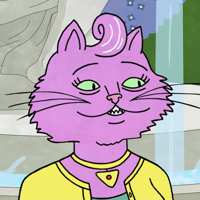Diane Nguyen mbtiパーソナリティタイプ
個性
"Diane Nguyenはどのような性格タイプですか? Diane Nguyenは、INFJ in MBTI、4w5 - so/sp - 415 in Enneagram、RLOAI in Big 5、EII in socionics のパーソナリティタイプです。"
diane: “do you remember the last time i saw you and you asked me if i thought you were a good person deep down?” bojack: “do i remember that? yeah, vaguely.” diane: “you really caught me off-guard.. i didn’t know what to say.” bojack: “well.. do you think i’m a good person deep down?” diane: “that’s the thing… i don’t think i believe in “deep down”. i kind of think all you are is just the things that you do.” this is precisely what INFJs analyze with Ni and Ti: they take directly from Fe and Se. this is the complete opposite of whatever INFPs have going on. INFPs make judgements of moral character in a way removed from the effects they have on external sentiment, sort of in an “idealized” way. similar to the way Ti idealizes systems while Te works directly from them as they relate to actual effects in the external world. Fi idealizes morals and value while Fe works directly from them as they relate to actual effects in the external world. diane can’t say “i think you are a good (or bad) person deep down” because she literally does not see moral character as being deep down. to Fe, it’s what you actually do that objectively shows if you are good or bad. to Fe, moral character is influenced by external effects, hence why it’s objective. for example, actively making an effort to help communicates morals/ethics/whatever the F functions deal with in an externalized way gets you Fe points instead of just the static purity of the beliefs like Fi. analogously to Te about Ti. Fe is really just like, “oh youre a good person? prove it”. in contrast to Te though, it’s not so much about the mechanical efficiency of what’s externally accomplished, but the objective measure of moral effort put into it and its sentimental effects. michael pierce makes the distinction between INFP and INFJ stunningly clear: “The Fe/Ti type (in this case, the INFJ) seeks to be "objective" (in the more traditional sense of the word) by providing a personally formulated rational justification for everything that they do. They do not regard personal feelings as justifications in-and-of-themselves, but only trust feelings that appear to them essentially impersonal -- which is a paradox, of course, for they are still "personal" insofar as feelings are necessarily personal, but they are impersonal insofar as they are, quite frankly, artificially generated for the sake of what they determine to be indisputably, rationally right. For while they only trust feelings that are impersonal in this way, they alternatively only trust reasoning that is purely personal. The philosophical epitome of this is Kant's notion of "duty" and the "good will", where he claims that truly ethical action must not be done out of any personal, ungrounded inclination (i.e. because you want to do it), but is only truly ethical insofar as it is done first and foremost because it is the truly rational thing to do (i.e. because you've discovered that you must do it). Kant later adds that if you also happen to want to do it, all the better, but it is primitive and ignoble for that to be the primary reason. I expect that this is all rather abhorrent to the Te/Fi type (especially the INFP), because for them the most "objective" way to go about things is to wholeheartedly trust and actually work with one's personal feelings, helping them flourish as they were meant to. Reason is conversely treated as impersonal insofar as it has nothing to do with the individual or their interests -- it simply is. This view finds its epitome in Kierkegaard, who claims the exact opposite of Kant: truly ethical action is that which is done precisely because you truly do want to do it, and never because some facticity makes it necessary. The INFP cannot fathom how one could find direction by imposing personal logics on oneself -- how could someone find their way without consulting their heart? Meanwhile, to the INFJ, putting such trust in one's personal inclinations is like receiving advanced business advice from a two-year-old: that is, how could one find their way by only consulting their heart, not their reason? This is why the INFJ can find the INFP (or other Fi preferring types) irritatingly selfish or self-centered, while the INFP finds the INFJ irritatingly insincere and ultimately untrustworthy. The INFP wants to reach the feeling core of the INFJ because that's what they're most comfortable working with -- then they would know how the INFJ emotionally ticks. But the INFJ refuses to let anyone see this core, because who they are is not this primordial core but how they choose to manifest it at any given point, for the sake of others. In a sense, the INFP wants to see the Platonic form of the INFJ's feeling, but the INFJ insists that the mere appearances of their feeling are what really matter -- the INFP wants the INFJ to reveal how they do their magic tricks, but the INFJ sees that as defeating the point of the magic trick -- to entertain and delight the audience.”
バイオグラフィー
A nerdy socially awkward writer from Boston who is Mr. Peanutbutter's girlfriend, then wife, then ex-wife & BoJack Horseman's good friend. Diane is initially tasked with writing BoJack's memoir, but the two become close throughout, as she spends a lot of time with him and relates to the horse's depression and struggles, as she also suffers similar issues to him.
個性 correlate

BoJack F. Horseman

Mr. Peanutbutter

Sarah Lynn

Todd Chavez

Princess Carolyn

Beatrice Horseman (née Sugarman)

Hollyhock Manheim-Mannheim-Guerrero-Robinson-Zilberschlag-Hsung-Fonzerelli-McQuack

Judah Mannowdog















